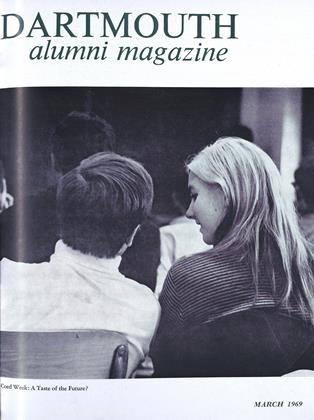By Brock Brower '53.New York: Atheneum, 1968. 331 pp.$7.95.
A writer who musters a series of his own magazine articles into book form is like a by-gone captain of militia who in his company finds country lads with pitchforks, society sportsmen with fowling pieces, and seasoned war veterans. The only common bond being defense, the captain must appeal to emotional shibboleths to establish a unifying patriotic theme.
Brock Brower's unifying theme is dual and multiple loyalties forcing each man to become something more than monochromatic and two-dimensional. The ensuing internal conflicts may march one into warfare with accepted social values. Often incomprehensible to the everyday world, unorthodox beliefs are depicted by Mr. Brower with tolerance, compassion, and detachment. In the superbly written account of what motivated "The Guys Who Fought in Spain," he implies that commitments eliciting the eagerness to offer one's life for a noble cause, difficult to recall in their fullness, may be misremembered.
He is at his best when he introduces an ironic note. In his final days as Secretary of Defense, Robert McNamara appears committed to a higher code of ethics and to a greater efficiency than most ordinary persons can endure. Though a remarkably humane person, he engages the intellect but does not plumb the reservoir of the deepest loyalties, the soul. Even more brilliant, the article entitled "Mary-McCarthyism," each facet highly and precisely polished, a minor classic, engages both mind and heart.
The section devoted to Brower loyalties is uneven, but "The Flag and I," "A Lament for Old Time Radio," and "Comeback" are unqualifiedly excellent, especially the last showing how a boy threatened by the return of his own boomerang achieves momentary mastery through intransigence.
In sum, Other Loyalties is engaging. Though the first impression is one of casual grace, sense is never subordinated to style; each is judiciously wrought. Brower is an effective and welcome antidote against those authors who attempt to force us to believe that we and all human beings are capable of sustaining only one truth. Such monomaniacal passion may breed monsters.
Mr. Cesari is Dean at Bennett College, Millbrook, N.Y.
 View Full Issue
View Full Issue
More From This Issue
-
 Feature
FeatureJames Marsh, Dartmouth, and American Transcendentalism
March 1969 By Douglas M. Greenwood '66 -
 Feature
FeatureFaculty Votes Reduced Status for ROTC
March 1969 -
 Feature
FeatureReaching Out from Hanover
March 1969 By Ron Talley '69 -
 Feature
FeatureCOED WEEK: A Taste of the Future?
March 1969 -
 Article
ArticleThe Undergraduate Chair
March 1969 By CHRIS KERN '69 -
 Class Notes
Class Notes1958
March 1969 By WALTER S. YUSEN, WILLIAM C. VAN LAW JR.
GENE S. CESARI '52
Books
-
 Books
BooksShelflife
Nov - Dec -
 Books
BooksTHE OFFICIAL ENCYCLOPEDIA OF SPORTS.
MAY 1965 By ERNIE ROBERTS -
 Books
BooksSCHOOLS FOR STRATEGY: EDUCATION AND RESEARCH IN NATIONAL SECURITY AFFAIRS.
JANUARY 1966 By HOWARD WRIGGINS '40 -
 Books
BooksMAKE YOUR OWN MOVIES. (FOR FUN AND PROFIT).
June 1939 By S. C. H. -
 Books
BooksCITIES IN THE WILDERNESS: THE FIRST CENTURY OF URBAN LIFE IN AMERICA
March 1939 By Wayne E. Stevens. -
 Books
BooksCHRETIEN DE TROYES: INVENTOR OF THE MODERN NOVEL.
March 1958 By WILLIAM R. LANSBERG '38


